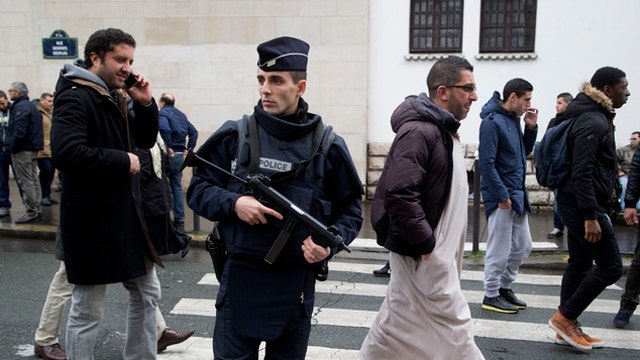French police: Up to six cell members may still be at large
Reaction from Steve Purl, former Scotland Yard detective
PARIS – As many as six members of a terrorist cell involved in the Paris attacks may still be at large, including a man who was seen driving a car registered to the widow of one of the gunmen, police officials said Monday.
Two French police officials also told The Associated Press that authorities were searching the Paris area for the Mini Cooper registered to Hayat Boumeddiene, the widow of Amedy Coulibaly. Turkish officials say she is now in Syria.
The disclosures came as France deployed 10,000 troops to protect sensitive sites — including Jewish schools and neighborhoods — in the wake of the attacks last week that killed 17 people last week. Brothers Cherif and Said Kouachi, as well as Coulibaly, their friend who claimed ties to Islamic extremists in the Middle East, died Friday in clashes with police.
One of the police officials said the cell consisted of about 10 members, and that "five or six could still be at large." He did not provide their names.
The other said the network was made up of about eight people and included Boumeddiene.
One of the other men believed to be part of the network has been seen driving Boumeddiene's car around Paris in recent days, the two officials said, speaking on condition of anonymity because they were not authorized to discuss the investigation with the media. They cautioned that it was not clear whether the driver was an operative, involved in logistics, or some other, less violent role in the cell.
One of the officials also said Coulibaly apparently set off a car bomb Thursday in the town of Villejuif, but that it did not receive significant media attention at the time because no one was injured.
Prime Minister Manuel Valls said the manhunt is urgent because "the threat is still present" after the attacks that began Wednesday with 12 people killed at the satirical newspaper Charlie Hebdo by gunmen the police identified as the Kouachi brothers.
Authorities said Coulibaly killed a policewoman Thursday and then killed four people at a kosher supermarket Friday before all three attackers were slain in two nearly simultaneous clashes with security forces around Paris.
Paris' Marais district — one of the country's oldest Jewish neighborhoods — was filled with police and soldiers by midday Monday. About 4,700 of the security forces would be assigned to protect France's 717 Jewish schools, Interior Minister Bernard Cazeneuve said.
"A little girl was telling me earlier that she wanted to live in peace and learn in peace in her school," Cazeneuve as on a visit to a Paris Jewish classroom, where the walls were covered with children's drawings of smiling faces.
"That's what the government, that's what the Republic, owes to all the children in France: security in all schools, especially in the schools that could be threatened," he added.
The children listened and waved both Israeli and French flags.
Israeli Prime Minister Benjamin Netanyahu visited the Paris kosher grocery where four of the hostages were killed Friday. Volunteers, meanwhile, recited prayers over the bodies of some hostage victims as they were prepared for burial by the Jewish Burial Society in Paris.
Defense Minister Jean-Yves Le Drian said the nationwide deployment of troops would be completed by Tuesday and would focus on the most sensitive locations.
"The work on these attacks, on these terrorist and barbaric acts continues ... because we consider that there are most probably some possible accomplices," Valls told BFM television.
French police have said the Charlie Hebdo attacks were carried out by three people, but only two of those attackers — Cherif and Said Kouachi — have been identified by authorities.
Video emerged Sunday of Coulibaly explaining how the attacks in Paris would unfold. French police want to find the person or persons who shot and posted the video, which was edited after Friday's attacks.
Boumeddiene was seen traveling through Turkey with a male companion before reportedly arriving in Syria with him on Jan. 8 — the day after the Charlie Hebdo attack and the same day Coulibaly began his murderous spree by killing the policewoman.
According to security camera video shown Monday by Turkey's Haberturk newspaper, Boumeddiene arrived Jan. 2 at Istanbul's Sabiha Gokcen airport. A high-ranking Turkish official, who spoke on condition of anonymity, confirmed the woman on the video was Boumeddiene.
Turkish intelligence then tracked Boumeddiene from her arrival.
Turkish Foreign Minister Mevlut Cavusoglu told the state-run Anadolu Agency that she had stayed at a hotel in Istanbul with another person before crossing into Syria on Thursday. She and her traveling companion, a 23-year-old man, toured Istanbul before leaving Jan. 4 for a town near the Turkish border, according to a Turkish intelligence official who was not authorized to speak by name.
Her last phone signal was Jan. 8 from the border town of Akcakale, where she apparently crossed into Islamic State-controlled territory in Syria, the official said. Their Jan. 9 return plane tickets to Madrid went unused.
Witnesses said the Kouachis claimed they were being supported by Al Qaeda in Yemen, the group the U.S. considers the most dangerous offshoot of that network. In his video and in comments to French media before he died, Coulibaly pledged allegiance to the Islamic State group, which has taken over large sections of Iraq and Syria but is a bitter rival of Al Qaeda.
Ties among the three attackers date back to at least 2005, when Coulibaly and Cherif Kouachi, 32, were jailed together. It later emerged that Said Kouachi, 34, fought with or was trained by Al Qaeda in Yemen. Cherif Kouachi was also convicted in 2008 along with several others of belonging to a network that sent jihadis to fight American forces in Iraq.

